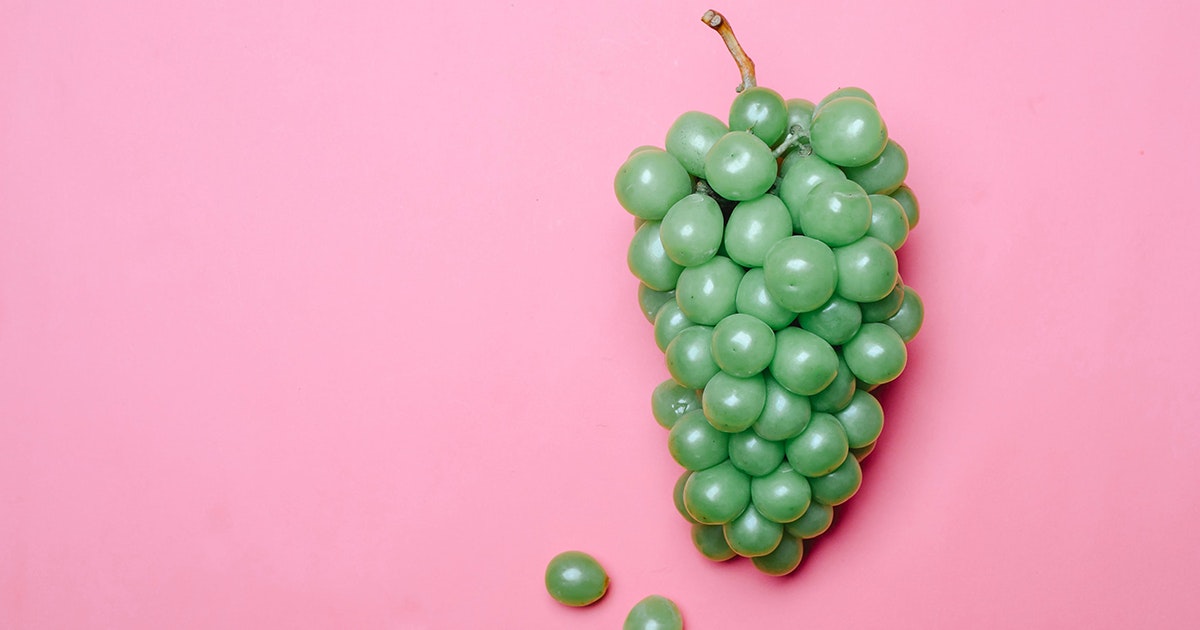Yes, grape juice has iron. But when it comes to how much, the processing or manufacturing method plays a role. An 8-ounce cup of cold-pressed grape juice will provide about 0.4 milligrams of iron.
Grapes are naturally a decent source of iron, but if the juice is made by the traditional juice extraction methods that involve pasteurization and high heat, many of the nutrients, including iron, are destroyed. To replace them, commercial juice manufacturers typically add various supplements and fortify juices by adding ascorbic acid (vitamin C).
In contrast, the cold-pressing process typically involves minimal heat, which helps to retain more of the nutrients, including iron and vitamin C.
In this article, we’ll look at the importance of iron in a healthy diet, the different types of iron, and its bioavailability in the body. Furthermore, we’ll explain how vitamin C can enhance your body’s absorption of iron and suggest other iron-rich juices to mix with grape juice to increase the iron content.
Why is Iron Important?
Iron is an essential nutrient that helps carry oxygen in the blood and supports a healthy immune system. Though it's a tiny micronutrient, iron supports many vital functions.
However, your body cannot produce iron, and you have to get it from your diet. Iron that you get from plant sources like grapes is called nonheme iron, and iron from animal sources is called heme iron.
The difference is in the body's ability to absorb iron – nonheme iron is not as easily absorbed as heme iron.
The Role of Vitamin C in Iron Absorption
Vitamin C improves the bioavailability of nonheme iron, which means you don't have to get your iron exclusively from animal sources.
You can maintain healthy iron levels by making grape juice and other iron-rich juices part of your healthy diet. Fortunately, you can blend different juices to ensure you always consume vitamin C along with iron.
It's important to keep in mind that dietary choices should be part of a well-balanced and varied diet. The good news is that, along with iron, grape juice is loaded with nutrients that your body needs.
One 8-ounce cup of raw grapes contains the following nutrients:
- Vitamin C: Vitamin C is one of the most essential nutrients required for life. It is an antioxidant that strengthens your immune system and prevents oxidative stress. Vitamin C also boosts iron absorption.
- Vitamin K: Vitamin K is important for blood clotting and healthy bones and also has other functions in the body.
- Copper: Your body uses copper to carry out many important functions, including making energy, connective tissues, and blood vessels. while vitamin K is vital for blood clotting and healthy bones
- Calcium: Calcium is a mineral typically associated with healthy bones and teeth, although it also plays an important role in blood clotting, muscle contraction, and the regulation of normal heart rhythms and nerve functions.
- Magnesium: Magnesium is important for many processes in the body, including regulating muscle and nerve function, blood sugar levels, and blood pressure and making protein, bone, and DNA.
- Phosphorus: Phosphorus is a mineral contained in each cell in our body. Most of it is in the bones and teeth, and some is in your genes. Your body needs phosphorus to make energy and to carry out many important chemical processes.
- Potassium: Potassium is an essential electrolyte that helps regulate the balance of fluids in and around cells. It works in tandem with sodium to maintain proper fluid balance, which is crucial for normal cell function.
- Sodium: Sodium helps maintain the balance of fluids in and around your cells. It works as the counterpart of potassium to regulate the body's water content.
Health Benefits of Drinking Grape Juice
In the January 2020 issue of Critical Reviews in Food Science and Nutrition, researchers noted that in addition to enhancing iron absorption, adding grape juice to your diet offers other health benefits.
1. Potential Protection Against Sun Damage
A new study by researchers in the University of Alabama at Birmingham's Department of Dermatology found evidence that grapes may help prevent skin damage caused by the sun's harmful ultraviolet rays.
2. Potential Protection Against Heart Disease
Grapes may protect heart health in several ways:
- Evidence exists that grape juice can help prevent blood clots by increasing nitric oxide levels in the blood.
- Grapes are packed with antioxidants that may prevent LDL cholesterol oxidation, which blocks the blood vessels and may lead to certain coronary conditions.
- Grape juice also contains two powerful flavonoids, called resveratrol and quercetin, which help filter out toxins from the bloodstream and positively affect LDL cholesterol levels.
3. Potential Protection Against Cognitive Impairment
The many antioxidants in grape juice may protect brain health and slow down the development of neurological diseases.
- The powerful flavonoid, resveratrol, in grape juice may reduce the risk of Alzheimer’s disease by reducing the levels of certain peptides in Alzheimer’s patients.
- According to the British Journal of Nutrition, grape juice may even improve memory and brain health in older people – even after they’ve started showing signs of mild cognitive impairment.
4. Potential Protection Against Osteoarthritis
At an Experimental Biology conference in San Diego, California, researchers suggested that the polyphenols found in pure grape juice may help alleviate pain associated with symptomatic osteoarthritis of the knee. It may improve joint flexibility and overall mobility.
Other Iron-Rich Juices
If you love your grape juice, and you’re struggling with iron deficiency anemia or just want to increase your iron consumption without getting it from animal sources, here’s how. Mix any of the following iron-rich fruit or veggie juices into your grape juice or smoothie.
NOTE: Just remember that the iron in plant-based foods is non-heme iron, which is not as easily absorbed by the body as heme iron from animal sources. To enhance iron absorption, you should always pair your iron-rich juices with vitamin C-rich fruits or vegetables in your juices, as vitamin C can improve the absorption of non-heme iron.
Spinach: Spinach is a good source of nonheme iron. Other dark green vegetables, such as cabbage and broccoli, also contain nonheme iron.
Kale: Kale contains approximately 1.59 mg of iron per 100 g, making it a healthy way to boost your iron intake.
Asparagus: Asparagus is an interesting option when experimenting with juice blends. Along with its iron content, this spring vegetable also contains potassium and fiber.
Prunes: Prunes are dried plums. A cup of prune juice contains 3 milligrams of iron, making it an excellent choice to blend with grape juice for an iron boost. However, keep in mind that prunes can be quite sweet and high in natural sugars, so it's a good idea to balance them by also adding other ingredients like leafy greens.
Vitamin C-Rich Ingredients to Enhance iron Absorption
Vitamin C is known to enhance the absorption of nonheme iron, which is the type of iron found in plant-based foods. Here are some fruit and vegetable juices that are rich in vitamin C, and can help with the absorption of nonheme iron if blended with grape juice and other iron-rich juices:
Citrus Juice: Orange, grapefruit, and lemon juice are some of the most popular sources of vitamin C and can significantly improve the absorption of nonheme iron from grapes and grape juice.
Kiwi Juice: Kiwi is a fruit that's exceptionally rich in vitamin C. Drinking kiwi juice can help enhance the absorption of nonheme iron.
Strawberry Juice: Strawberries are packed with vitamin C, and their juice can be beneficial for increasing iron absorption from juices of plant sources.
Tomato Juice: Tomato juice contains vitamin C and is often added to iron-rich juices to boost nonheme iron absorption.
Conclusion
In conclusion, grape juice may not be an iron powerhouse, but it offers a host of additional nutritional benefits. Be creative and explore different combinations of grape juice and other iron-rich fruits and vegetables to increase your iron intake. And by pairing it with vitamin C-rich juices, you can ensure your body receives the full spectrum of nutrients it needs to thrive. As with any dietary choice, maintaining a balanced and diverse diet is key to overall health and well-being.


Comment